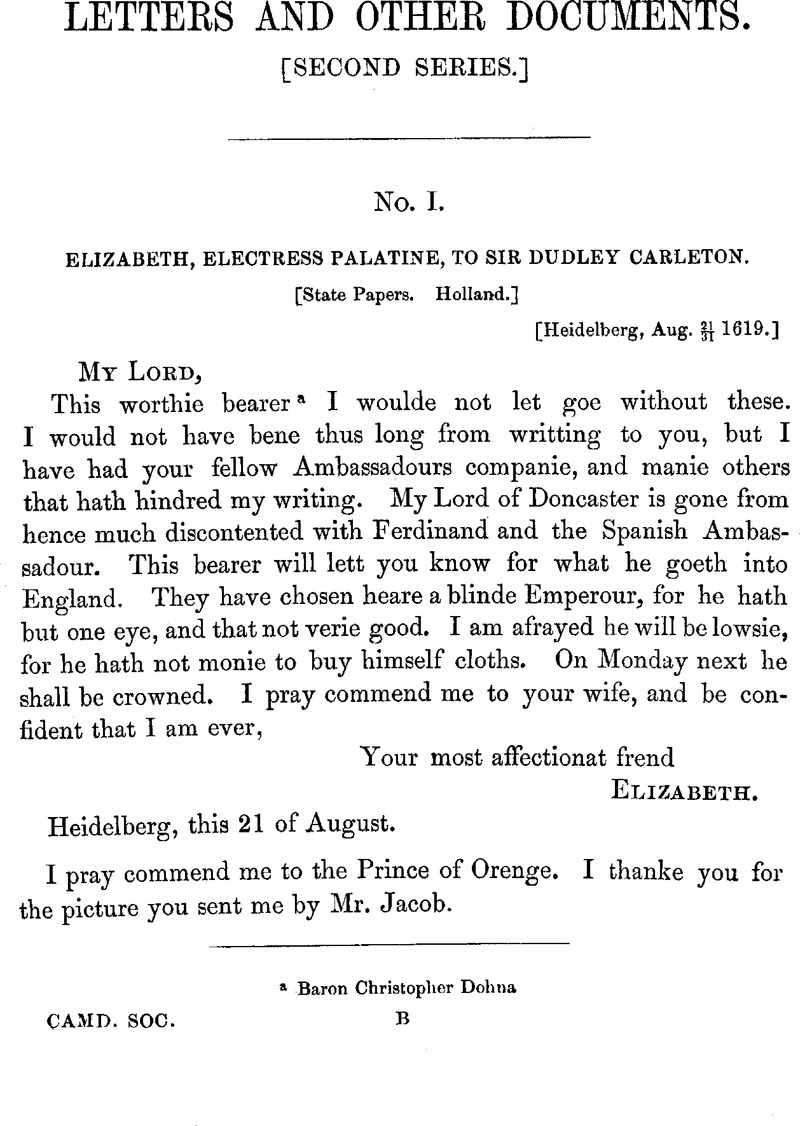No CrossRef data available.
Article contents
Abstract

- Type
- Letters Illustrating the Relations Between England and Germany
- Information
- Copyright
- Copyright © Royal Historical Society 1868
References
a Baron Christopher Dohna
page 3 note a Bethlem Gabor.
page 4 note a He was to bring back an answer to Doncaster's request for leave to return to England.
a From Caron's despatch to the States General of the ![]() September, it appears that the news of Frederick's election was brought by Dohna to James at Bagshot on the evening of the
September, it appears that the news of Frederick's election was brought by Dohna to James at Bagshot on the evening of the ![]() of September.
of September.
a Originally written 6, but altered to 7.
page 10 note a The paper here mentioned is amongst the State Papers, but it does not contain anything which is not to be found in print already.
page 11 note a Mannheim.
page 11 note b Perhaps Meersen.
a Doncaster.
page 14 note a Series i. No. i.
page 14 note b Ser. i. No. x.
page 14 note c Ser. i. No. xxxviii.
page 14 note d Ser. i. No. xlvii.
page 14 note e Letter not preserved.
The date should evidently be 1619.
page 14 note f A Councillor of the Elector Palatine.
page 15 note a Letters not preserved.
page 15 note b If the date is correctly given, the letter has not been preserved. The eye of the clerk who drew up this paper probably caught the mistaken entry of 1618 to the last article, and thus described erroneously a letter of Dec. 2, 1618, as “not long after” a letter of May 26, 1619.
page 15 note c Letter not preserved.
page 15 note d Letters not preserved.
page 15 note e Letter not preserved.
page 15 note f Letter not preserved.
page 15 note g Ser. i. No. v.
page 16 note a Letter not preserved.
page 16 note b Ser. i. No. xxi.
page 16 note c Letter not preserved.
page 16 note d Ser. i. No. Ixvi.
page 17 note a Ser. i. No. Ixvii.
page 17 note b Ser. i. No. Ixxx.
a Aix-la-Chapelle.
a For the late Queen.
a On the 3rd, according to Caron, see p. 8, note.
a Julian Sanchez de Ulloa.
a Marginal note by Sir R. Naunton:—“These lettres were stayd so long with the Prince Palatine that, the moneth being past within which they required answer before they came hither, his Majesty tould Secretary Calvert it was then too late to retorne any aunswere to that poincte and so he retorned none, but left it to that Dukes own discrecion what to do.”
a The Earl of Pembroke.
b Of the Household.
a I cannot leave this entry without an expression of my feeling at the loss of one by whom many of the papers in this volume were transcribed, and who was not merely ready to execute with accuracy any work which he undertook, but whose vast stores of information relating to everything connected with the public depositories of MSS. in this country were always placed cheerfully at my service whenever I applied to him in any difficulty.
a This portion is holograph; the previous and subsequent parts are written by a secretary and signed only.
a The Prince of Condé.
a To the Treaty of Alliance.
a The Elector's brother.
a Ratisbon.
b Count Leveneur de Tillieres.
a The Deputies of the States General.
page 77 note a Some words seem to be omitted here.
page 82 note a The Archduke Leopold.
a Van Male.
b Dohna and Caron.
a A small place a few miles south of Pontebba on the road to Venice.
a Paternion, the first post town out of Villach on the road to Tyrol.
a Namely, a Spanish invasion of the Palatinate.
a In England.
a A Frenchman accused of robbing the late Queen.
b An accomplice of Hugon.
page 110 note a So in MS. for “it.”
page 113 note a Perhaps “to use” is omitted.




